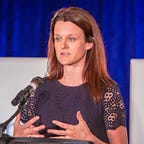Igniting a National Conversation on Cancer: A Readout of the Cancer Moonshot Summit in 13 Tweets
How do you sum up the work of thousands as part of the Cancer Moonshot Summit? In a series of 13 tweets from participants, of course! (Plus a few additional details.)
The gist: On June 29, 2016, the Vice President convened nearly 400 cancer researchers, oncologists, nurses, patients, advocates and others at Howard University in Washington, D.C. Over 7,000 more came together at hospitals, community care centers, businesses, and in family rooms at more than 300 local summits across all 50 states, Puerto Rico, Guam, and Washington, D.C. The Vice President issued a call to action: “If you’re stepping up in your community — volunteering, collaborating across disciplines, or launching a new initiative — I want to hear about it. Because every single one of us #CanServe a role in beating this disease.”
The goal: To ignite a national — and even international — conversation to fundamentally change the trajectory of progress in cancer prevention, diagnosis, treatment, and care to make a decade’s worth of progress in half the time. Spearheaded by the Vice President, the Cancer Moonshot is on the path to make a significant difference.
The announcements: Individuals and organizations from the oncology community and beyond–the private, non-profit, and academic sectors–stepped up to the Vice President’s call to action and showed how they #CanServe by announcing more than 35 new actions and collaborations. They include new commitments to advance cancer prevention and research, expedite life-saving treatments and therapies to patients, increase data sharing, and improve access to excellent cancer care, among others.
The coversation: Participants in Washington, D.C. and at summits across the country addressed topic areas relating to cancer prevention, screening, and early diagnosis, cancer research and advancing new treatments, universal access to quality care, and how to share data so all areas of cancer research and care move faster to make a difference to patients sooner. Here is some of what we heard:
- Make it easier for patients to access their data, transfer it between practices, and contribute to research.
- Network patients, survivors, and advocates so that patients can find the support and resources they need.
- Enhance prevention efforts and increase access to early screening and accurate diagnostics.
- Design care plans, clinical trials, and treatment centers that work for patients.
- Reward team science.
- Provide a way and incentives for researchers to share more data.
- Create a cancer “heatmap” to target prevention, screening and early intervention, where it is most needed.
- Make research results freely accessible at the time of publication.
- Explain all clinical trials in plain language so everyone can understand all available options.
- Create a national network that matches patients to clinical trials and other treatments that may make a difference.
- Bring researchers and oncologists together to develop a standard protocol for collecting tissue so that it can reliably be used for research, to advance diagnosis and therapies.
- Encourage investment in and development of therapies for pediatric cancers.
The Cancer Moonshot Summit is just the beginning; these ideas will require new partnerships and actions from the public and private sectors to continue to move them forward.
The bottom line: The Summit underscored the Vice President’s belief that we are at an inflection point when it comes to addressing cancer and that there is reason for HOPE. I saw it in the faces of the patients, family members, advocates, doctors, and others who gathered in Washington, D.C., and heard it loud and clear in the posts from participants all across the world.
The takeaway: Like many Americans, I have been deeply and personally touched by cancer and that motivates me every day. Together we can achieve incredible things and we should all feel compelled to use this moment, this opportunity, and the leadership of Vice President Biden to truly change the trajectory of cancer. The Cancer Moonshot Summit is only the beginning, let’s continue to show the world how we all #CanServe.
Danielle Carnival is the Chief of Staff and Senior Policy Director for the White House Cancer Moonshot Task Force. Danielle has a Ph.D. in Neuroscience, is a bicycling and STEM education enthusiast, and lives in Washington, D.C. with her husband and toddler son.
